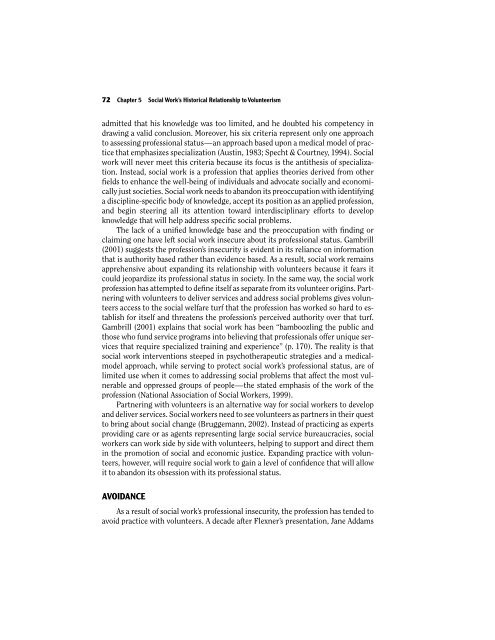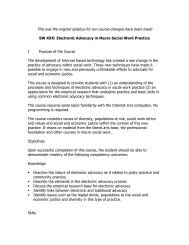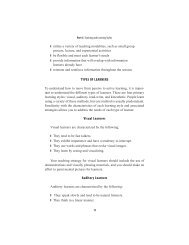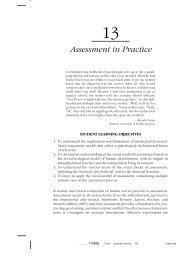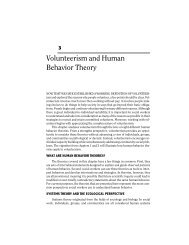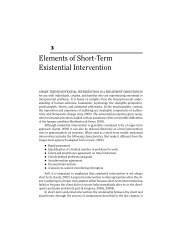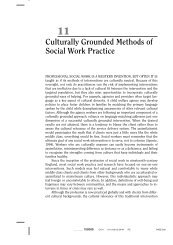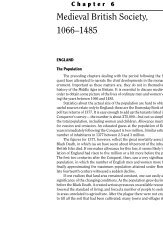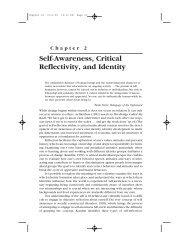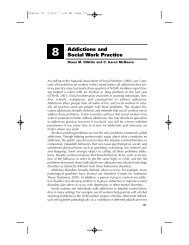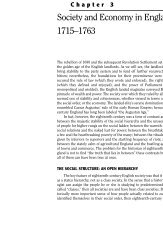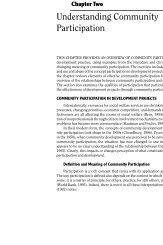Social Work's Historical Relationship to Volunteerism - Lyceum Books
Social Work's Historical Relationship to Volunteerism - Lyceum Books
Social Work's Historical Relationship to Volunteerism - Lyceum Books
Create successful ePaper yourself
Turn your PDF publications into a flip-book with our unique Google optimized e-Paper software.
72 Chapter 5 <strong>Social</strong> Work’s <strong>His<strong>to</strong>rical</strong> <strong>Relationship</strong> <strong>to</strong> <strong>Volunteerism</strong><br />
admitted that his knowledge was <strong>to</strong>o limited, and he doubted his competency in<br />
drawing a valid conclusion. Moreover, his six criteria represent only one approach<br />
<strong>to</strong> assessing professional status—an approach based upon a medical model of practice<br />
that emphasizes specialization (Austin, 1983; Specht & Courtney, 1994). <strong>Social</strong><br />
work will never meet this criteria because its focus is the antithesis of specialization.<br />
Instead, social work is a profession that applies theories derived from other<br />
fields <strong>to</strong> enhance the well-being of individuals and advocate socially and economically<br />
just societies. <strong>Social</strong> work needs <strong>to</strong> abandon its preoccupation with identifying<br />
a discipline-specific body of knowledge, accept its position as an applied profession,<br />
and begin steering all its attention <strong>to</strong>ward interdisciplinary efforts <strong>to</strong> develop<br />
knowledge that will help address specific social problems.<br />
The lack of a unified knowledge base and the preoccupation with finding or<br />
claiming one have left social work insecure about its professional status. Gambrill<br />
(2001) suggests the profession’s insecurity is evident in its reliance on information<br />
that is authority based rather than evidence based. As a result, social work remains<br />
apprehensive about expanding its relationship with volunteers because it fears it<br />
could jeopardize its professional status in society. In the same way, the social work<br />
profession has attempted <strong>to</strong> define itself as separate from its volunteer origins. Partnering<br />
with volunteers <strong>to</strong> deliver services and address social problems gives volunteers<br />
access <strong>to</strong> the social welfare turf that the profession has worked so hard <strong>to</strong> establish<br />
for itself and threatens the profession’s perceived authority over that turf.<br />
Gambrill (2001) explains that social work has been “bamboozling the public and<br />
those who fund service programs in<strong>to</strong> believing that professionals offer unique services<br />
that require specialized training and experience” (p. 170). The reality is that<br />
social work interventions steeped in psychotherapeutic strategies and a medicalmodel<br />
approach, while serving <strong>to</strong> protect social work’s professional status, are of<br />
limited use when it comes <strong>to</strong> addressing social problems that affect the most vulnerable<br />
and oppressed groups of people—the stated emphasis of the work of the<br />
profession (National Association of <strong>Social</strong> Workers, 1999).<br />
Partnering with volunteers is an alternative way for social workers <strong>to</strong> develop<br />
and deliver services. <strong>Social</strong> workers need <strong>to</strong> see volunteers as partners in their quest<br />
<strong>to</strong> bring about social change (Bruggemann, 2002). Instead of practicing as experts<br />
providing care or as agents representing large social service bureaucracies, social<br />
workers can work side by side with volunteers, helping <strong>to</strong> support and direct them<br />
in the promotion of social and economic justice. Expanding practice with volunteers,<br />
however, will require social work <strong>to</strong> gain a level of confidence that will allow<br />
it <strong>to</strong> abandon its obsession with its professional status.<br />
AVOIDANCE<br />
As a result of social work’s professional insecurity, the profession has tended <strong>to</strong><br />
avoid practice with volunteers. A decade after Flexner’s presentation, Jane Addams


